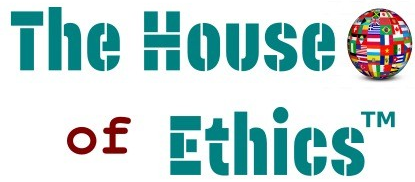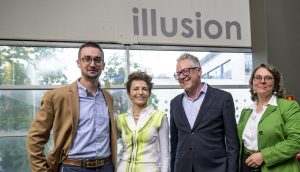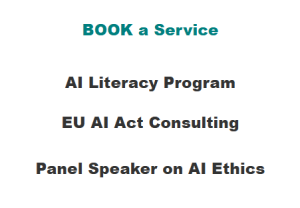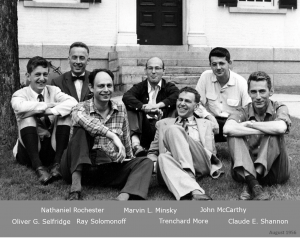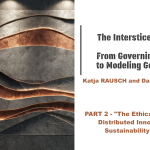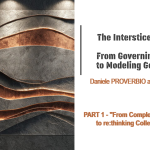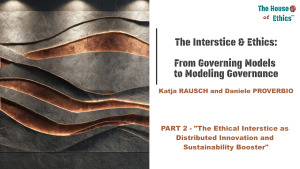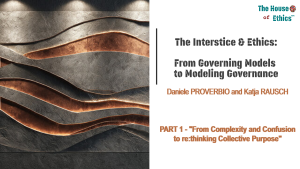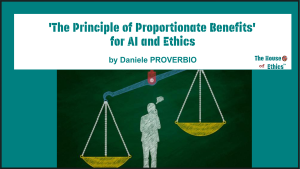Aging 5.0 – De Profundis & In Extenso – Rejuvenating Adaptive Cyber-Ethics in Eldercare.
A dual Perspective on AI Ethics Governance for Aging Populations
Recent headlines of aging patients who revolted against care facilities and broke out because of non-alignment with personal or human basic expectations of care and human rights.
We remember the Austrian nuns, Sister Bernadette, Sister Regina and Sister Rita aged 88, 86 and 82 escaping from their nursing home because it simply was «it was too much ». Meaning unbearable. And nobody should experience such low life conditions and psychological pain, especially not those patients who are frail and powerless due to age (young or old) or cognitive or physical impairments.
Why does the extend of what happened in Austria express a general state of unease and reveal systemic problems in eldercare ? For nuns to become mutineers, squatters and eventually outlaws we need to open critical debates of the existing and work on improving our collective tomorrow.
A crucial question for all of us gravitates around a common nucleus : How do we want our loved ones to be taken care of and how do we foresee our own aging ?
Why it not only is a medical outlook but also a societal thus cultural, generational and ethical. Fact is that role of ethics in senior care is fundamental and gains a crucial momentum in the digital age.
« De Profundis »
Everybody might concur that core principals of ethics of care evolve around respect, dignity, fairness, empathy and equity. But these words sound too polished compared to actual conditions on the field. They are ubiquitous in printed glossy brochures and dynamic online videos. Ethics codes are more easily written than lived. Seldom found in care giving facilities or medical units, and even less integrating residents, families, and caregivers alike.
Traditionally the question is addressed by debates around beneficence and non-maleficience. On the one hand the obligation to provide services which grant bell-being and a decent quality of life, and on the other hand, non-maleficience, meaning any efforts to prevent harm, neglect, injuries and human rights violations. Emphasing dignity, autonomy or rights to free thinking or free deciding are major and fundamental rights to choose one’s treatments or the refusing of treatments.
The medical field with the legal world are two prime ecosystems which gravitate around a center concept : confidentiality. Thus trust and decisional ownership being two major corner-stones. Precisely the ones being of the highest value in elder care, especially when physical health and strength vanish and cognition declines.
What exactly shapes a « De Profundis » approach ? Mainly an universal human aspect in senior care concentrating on two leading approaches in ethics : relational ethics and ethics of care.
Unlike standard ethical frameworks that primarily emphasize principles like autonomy, beneficence, justice, care ethics centers on the importance of relationships, emotional bonds, empathy and self-estime. With cognitive or physical impairment, autonomy may not be fully possible. Here the moral values of caregivers, medical or family, are significant.
In relational ethics, the focus sits on emotional well-being and human connection. What exactly does this mean when talking about elderly and more generally sick people ? It is about recognizing them as persons with identities, rights, lifestories and behaviors. Relational ethics enforces personal uniqueness, respectful empathy and social dignity above functional medical treatment.
Some angles to be considered are
Feeling of safety – psychological and physical safety. Not only the ambiance or the topology of facilities but also the rhetoric. Linguistics, wording and tone of voices are crucial vectors of care, empowerment, self-estime (beyond empathy), hope and care. They need to be carved carefully and mostly shift away from general, average standard formulas. Like precision health one needs precision elder rhetoric.
Cultural adaptability – fluid and adapted cultural care practices are crucial to the elder. Developing the ease of heart where the heart of the frail is at comfort. Merging the human and technological augmented intelligences into powerful digital anthropology applied to the medical field.
Social integration – integration does not mean accumulation or grouping. It means getting the right minds, hearts and personalities together. Not just old people around a table for activities. Presence does not make up for the right persons’ presence. If the wrong people are present, fear and anxiety are the results. Even harder than no presence at all.
Developing self-estime – when old and frail, error and mistakes are on elderly’s mind. Am I doing this right ? Instead of blaming using empowering techniques. Those are techniques to be developed easily and collectively.
Fostering various degrees of autonomy in decision-making. Decision-making nutures self-estime. Even if in small doses, the outcome might be powerful and impactful on the elderly and frail. It does not need much. Incremental steps can lead to gigantic results. Verbalising or giving a voice to everybody is a central part of ethics of care as introduced by its pioneer Carol Gilligan in the 1970s.
Re:thing the « ingredients » of individual beneficence on a micro-level, complementary to the collective macro-level as acting in the best interest of the patient and justice thus ensuring fair access to care to prevent neglect, discrimination or abuse.
How can we build that very special trust ? Are transparency and upholding ethical standards enough ? Or do we need something more ?
Fact is that ethical principals are worthless without steadiness. Ethical principals are living energy and not carved in stone principles.
People carry values and act values. Values live on a daily basis. Thus continuity is key. A value becomes an accepted value through its energy of impact or impact of energy on people.
« In Extenso »
Through « In Extenso », we call for a flexible yet defined type of governance by cross-challenging the « De Profundis» perspective with a more technological modus operandi.
How to integrate digital and technological elements like carebots, physical AI, sensitive data governance, human-machine interfacing through conversational bots, or medical wearables (IoMT / Internet-of-medical-things) or digital twins for precision and predictive medicine into daily operations ?
And looking towards the limitless, and ethical frontiers of healthcare and longevity (and even transhumanism). How and where do they challenge relational care ethics for the aging (but not only) population ?
Innovative solutions are in demand since technological tools collide with new foresights, and evolving generational and cultural expectations. How to maintain a high level of care ethics without being outpaced by a potentially cannibalising technological integration ?
How to reimagine and shape new hybrid, digital and human, biospheres by building on AI-powered solutions and keeping a healthy balance with patient ethics of care ?
These challenges and changes are beyond incremental. They demand for a clear understanding of the potentialities offered by the many systems converging : humanities or soft sciences like philosophy, ethics or psychology (critical reasoning), medical sciences (clinical reasoning), hard sciences (technological reasoning), policies and compliance (legal reasoning) to adapt the existing to emerging new contexts with all actors involved.
Rejuvenating Care Ethics by Adaptive Integration
So how to best address it ? Three paths to explore.
Regular ethics committees and systematic ethics meetings are not good enough.
The key element lies in the integration or involvement of outside involvement or outside ethics. Only by raising additional, over the horizon, and alternate questions can perspectives evolve and alternate angles and novel practices arise.
2. Discourse ethics : By using discourse ethics techniques à la Habermas eventual ethical blindspots can be collectively identified and novel solutions shaped together in an interdisciplinary and panoptical view.
Discourse ethics is a vital resources to address traditional ethical dilemmas which arise daily in medical fields when systemic, psychological or functional conflicts arise between for example independence and safety or data ownership and confidentiality.
3. Ongoing educational programs in AI Literacy training to feed novel governance practices.
Being continuously updated on the latest policies, compliance and ethics guidelines effectively supports the evolution of best practices. The House of Ethics has developed its proprietary 360° DISC™ AI Literacy Program – an Decentralized, Interdisciplinary, Systemic and Collective Approach to AI, Regulation and Humanities for verticals like healthcare, legal, finance and industry.
Only then can regular inspections, care outcomes and performance reports be turned into ethical trust builders.
Let’s not forget that the heart always beats the silicon. But the silicon can support the heart.
Spécialisée dans l’éthique des nouvelles technologies, Katja Rausch travaille sur les décisions éthiques appliquées aux domaines tels l’intelligence artificielle, la data éthique, les interfaces machine-homme, la roboéthique ou la Business éthique.
Pendant 12 ans, Katja Rausch a enseigné les Systèmes d’Information au Master 2 de Logistique, Marketing & Distribution à la Sorbonne et pendant 4 ans les Data Ethics au Master de Data Analytics à la Paris School of Business.
Diplômée de la Sorbonne, Katja Rausch est linguiste et spécialiste en littérature du 19ème siècle. Partie à la Nouvelle-Orléans aux États-Unis, elle a intégré la A.B. Freeman School of Business pour un MBA en leadership et enseigné à Tulane University. À New York, elle travaille pendant 4 ans pour Booz Allen & Hamilton, management consulting. De retour en Europe, elle devient directrice stratégique pour une SSII à Paris où elle conseille, entre autres, Cartier, Nestlé France, Lafuma et Intermarché.
Auteure de 6 livres dont un dernier en novembre 2019, Serendipity ou Algorithme (2019, Karà éditions). Elle apprécie par-dessus tout les personnes polies, intelligentes et drôles.
- Katja Rausch
